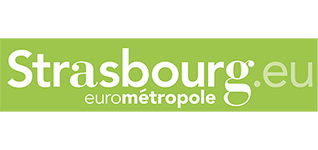Strasbourg Métropole

Strasbourg is the capital and largest city of the Grand Est region of France and is the official seat of the European Parliament. Located at the border with Germany in the historic region of Alsace, it is the capital of the Bas-Rhin department.
In 2016, the city proper had 279,284 inhabitants and both the Eurométropole de Strasbourg (Greater Strasbourg) and the Arrondissement of Strasbourg had 491,409 inhabitants. Strasbourg’s metropolitan area had a population of 785,839 in 2015 (not counting the section across the border in Germany), making it the ninth largest metro area in France and home to 13% of the Grand Est region’s inhabitants. The transnational Eurodistrict Strasbourg-Ortenau had a population of 915,000 inhabitants in 2014.
Strasbourg is one of the de facto three main capitals of the European Union (alongside Brussels and Luxembourg), as it is the seat of several European institutions, such as the Council of Europe (with its European Court of Human Rights, its European Directorate for the Quality of Medicines most commonly known in French as “Pharmacopée Européenne” its European Audiovisual Observatory), the Eurocorps, as well as the European Parliament and the European Ombudsman of the European Union.
The city is also the seat of many non-European international institutions such as the Central Commission for Navigation on the Rhine and the International Institute of Human Rights.[11] It is the second city in France in terms of international congress and symposia, after Paris.
Strasbourg’s historic city centre, the Grande Île (Grand Island), was classified a World Heritage Site by UNESCO in 1988, the first time such an honour was placed on an entire city centre. Strasbourg is immersed in Franco-German culture and although violently disputed throughout history, has been a cultural bridge between France and Germany for centuries, especially through the University of Strasbourg, currently the second largest in France, and the coexistence of Catholic and Protestant culture. It is also home to the largest Islamic place of worship in France, the Strasbourg Grand Mosque.
Economically, Strasbourg is an important centre of manufacturing and engineering, as well as a hub of road, rail, and river transportation. The port of Strasbourg is the second largest on the Rhine after Duisburg in Germany, and the fourth largest river port in France after Nantes, Rouen and Bordeaux.
EXPERTISE IN ENVIRONMENTAL PROTECTION AND DEVELOPMENT AND LIVING CONDITIONS POLICY
- household waste management
- the energy transition and the territorial climate-energy plan
- gas and electricity concessions
- aquatic environment management and flood prevention
- the fight against air pollution and noise pollution
- the environmental education center
 France
France